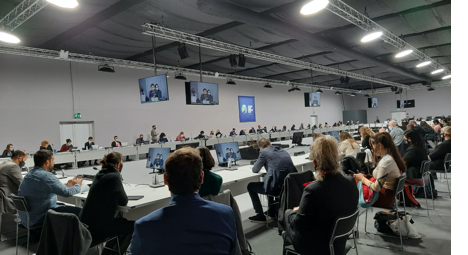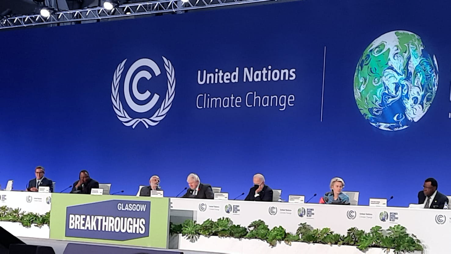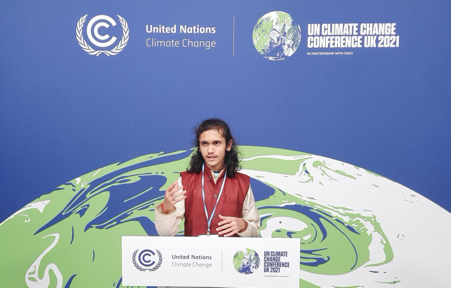Week 1: Will Glasgow deliver?


· 5 min read
"Code RED to the G7 countries, Code Red to the G20 countries," "Either We stop it - or it stops us," "Message from Earth to COP" - as these voices reverberated across the Scottish Event Campus, it was indeed an endeavor to make it irresistible for the world leaders from over 120 countries to roll up their sleeves. Did it pay off and "Open their Hearts?" Did the pioneers leave Glasgow with empty words or genuine pledges "motivated from hope, not fear"? Here is an Inside perspective from what I experienced, live, inside those negotiation rooms as I represented the youth constituency of the UNFCCC at the World Leaders Summit 2021.

Let's analyze the commitments that came from some of the developed nations: Japan committed an extra $10bn climate finance over the next five years. Germany plans to lower emissions from land use by 25m tonnes by 2030. Spain declared its plans to allocate 30 million euros to the United Nations adaptation plan in 2022 and plans to reach 1.35 billion euros per year by 2025. The UK aimed to engage 75% of farmers in low carbon practices by 2030 and announced funding of £500m to support the implementation of the Forest, Agriculture, and Commodity Trade (FACT) Roadmap. The EU committed to dedicate $27B and an additional 5B by 2027 for its EU Climate finance budget for supporting adaptation, biodiversity, and more.
Juxtaposing these with some of the commitments from the of the developing countries:
Brazil planned to scale its ABC+ low carbon farming program to 72m hectares, saving 1 billion tonnes of emissions. India launched the One Sun, one world, one Grid initiative and committed to increase its installed renewable capacity to 500 gigawatts (from current ~100GW), install 50 percent of its power capacity through non-fossil fuel resources, reduce carbon emissions by 1 billion tonnes, and reduce the carbon emissions intensity of the economy by 45 percent. Gabon, already being Net Positive, promised to present an even more ambitious NDC. Sri Lanka to co-lead for a global energy pact for no new coal power and welcomed investments and technology transfer. Ecuador's president announced on Nov. 1 an expansion of the existing Galápagos Islands marine reserve to encompass an additional 60,000 square kilometers (23,200 square miles). Furthermore, the presidents of Ecuador, Panama, Colombia, and Costa Rica also announced plans to create a large marine corridor by extending and joining their current marine protected areas.
From this comparison, we can clearly understand that while the developed countries' commitments are ambitious, they are more like giant leaps whose smaller milestones are unclear. Whereas the developing countries have mapped their destinations by understanding their roadmap and direct actions starting now. Even after the three-year delay of the 100B promise from the developed countries, several of such developing countries, LDCs and SIDS contribute despite having negligible per capita emissions. This is the time for the developed countries to step up and walk the talk.

So, have we progressed at the COP26 week 1? And is it enough to reach the 1.5 targets?
Let's have a look at the significant pledges that came out from groups of countries and signatories:
According to a report, if all of these pledges get implemented as proposed, we will have reduced 9 Gigatons (GT) out of the total 22GT required to achieve the net-zero. The commitments to reducing deforestation would give 3.5 GT reduction; Coal phase-out would give another 3.5 GT reduction; methane reduction: 0.5GT and Road Transport Electrification: 1.5GT reduction.
Furthermore, the IEA 1.8 PROJECTION said that all the climate pledges announced to date, including the new methane pledge, if met and implemented in full and on time, would be enough to hold the rise in global temperatures to 1.8 °C by 2100.
So the good news for all the tens of thousands of protesters that filled George Square a couple of days back is, the action inside is ON. But the need is to accelerate even further. With further efforts of the non-state actors (especially with UN SG's plan to launch a group of experts to analyze private sector commitments) and commitments expected in the second week of COP26 (especially on transport and cities), we still bear the hopes of 1.5 alive.

It is indeed a pleasure to be a part of the system and to influence and push the headway, sitting at the negotiations. I optimistically look forward to action and impact and urge all critical players in this space to collaborate towards consensus and not disputes; towards resilience and not solely profits; and towards impact via political will and not desolate words!
Energy Voices is a democratic space presenting the thoughts and opinions of leading Energy & Sustainability writers, their opinions do not necessarily represent those of illuminem.
illuminem briefings

Mitigation · Climate Change
illuminem briefings

Climate Change · Environmental Sustainability
Charlene Norman

Sustainable Business · Sustainable Finance
The Washington Post

Mitigation · Climate Change
Politico

Climate Change · Environmental Rights
The Guardian

Pollution · Nature